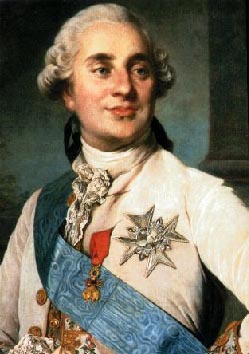
History has not been kind to Louis XVI; in fact, history is rarely kind to the losers. He is painted as vain, unintelligent, and ineffectual, so clueless that on the day the Bastille was seized by revolutionaries, he wrote in his diary, “Rien,” “Nothing happened”
It’s difficult, however, to really assign any blame. The Revolution itself was an extraordinarly complicated affair; it was principally lit by the antagonisms between the first two and the Third Estate, antagonisms rooted in decades of abuse and frustration. It is certain that Louis XVI failed to maintain the centralization of power; all the forces in France were conspiring to fragment power away from the monarchy.

Louis ascended the throne at the age of twenty; he was of average intelligence, but was not overly concerned with the running of the country. In the French imagination, he was seen as representing everything that the Estates opposed: centralized government, wealth, indifference. His wife, Marie Antoinette, was vilified by all the members of the Estates as indifferenct and calculating. The reality, however, was probably much different. Like most noblewomen, she was raised in an isolated atmosphere; her life at the French court was, like Louis’s, utterly isolated from the non-aristrocratic world. The Revolution took her and Louis by surprise; while she was vilified and hated by the Revolutionaries and the Third Estate, she had no part in any of the abuses of the government or the nobility which precipitated the Revolution. Her portrait, painted by Elisabeth Vigee-Le Brun, in fact displays none of the distance typical of royal portraits.
When Louis had first ascended the throne, his chief financial officer was a man named Anne Robert Jacques Turgot (1727-1781), who was a brilliant and creative administrator. Turgot instantly set about trying to reform the country’s financial situation by instituting a series of reforms that included replacing the corvée with a tax on landowners, an easing of guild laws to allow industrial manufacturing to increase, and, radically, a sharp cut in monarchical expenses. Had these reforms gone through, the Revolution probably would never have happened. These reforms, however, were the cause of the agitation by the Parlements in reasserting their veto rights—these Parlements were, of course, made up largely of nobility who would have to pay the new tax.
When the reforms failed, Louis dismissed Turgot. From that point onwards, the country would fall into ruinous financial crisis. At the heart of the crisis was the financial and administrative mismanagement of taxes. Both the Seven Years War and the French support of the American Revolution had put France deeply in debt; over one half of the country’s budget was dedicated to paying off that debt. While this sounds extreme, it was fairly typical of European countries at the time.
Tax collection, however, was a disaster. Taxes varied from region to region, and most of the taxes were collected by private businessmen. They would loan the taxes to the government and then collect the taxes directly; they then paid themselves both the principal and the interest on the loan and sent the rest to the government. They were, of course, free to withhold as much as they wanted, so the Third Estate was paying far more in taxes than actually went to the government. What’s worse is that the finances of the country were not centralized; there were hundreds of offices disbursing out money. By the 1780’s, no-one had any idea as to what the total asset and liability profile of the nation looked like.
The financial crisis precipitated a steep inflationary rise in prices. This inflation was good news for French manufacturing and mercantilism because it resulted in a significant shot of capital into emerging industrial and mercantile businesses. It played hell, however, with the peasantry. Not only did the peasants have to pay higher prices for the basics of life (the peasants lived in a subsistence economy only), but landlords began raising fees on the peasantry when they saw their purchasing power decrease. By 1789, over 80 percent of an average peasant’s household income went to purchasing bread alone—just bread. In that same year, unemployment in many parts of France was over 50%.
The stage is set. In 1787, Louis’s financial ministers, Charles de Calonne and Loménie de Brienne, try to initiate a series of reforms to stave off the complete financial ruin of the French government. They want new taxes. The Parlements , which have the authority to raise taxes, want something in return: more regional independence. The aristocracy won’t budge on the matter; when Louis calls a select group of nobles together to sell him on the reforms, they flat out refuse to consider the matter. They insist, rather, that the only legislative body that can approve the new taxes is the Estates General, which hadn’t been called since 1614.
Louis had no choice. He called the Estates General in 1788, and, without anyone knowing it, the Revolution had begun.
[Source: http://wsu.edu/~dee/REV/LOUISXVI.HTM]

